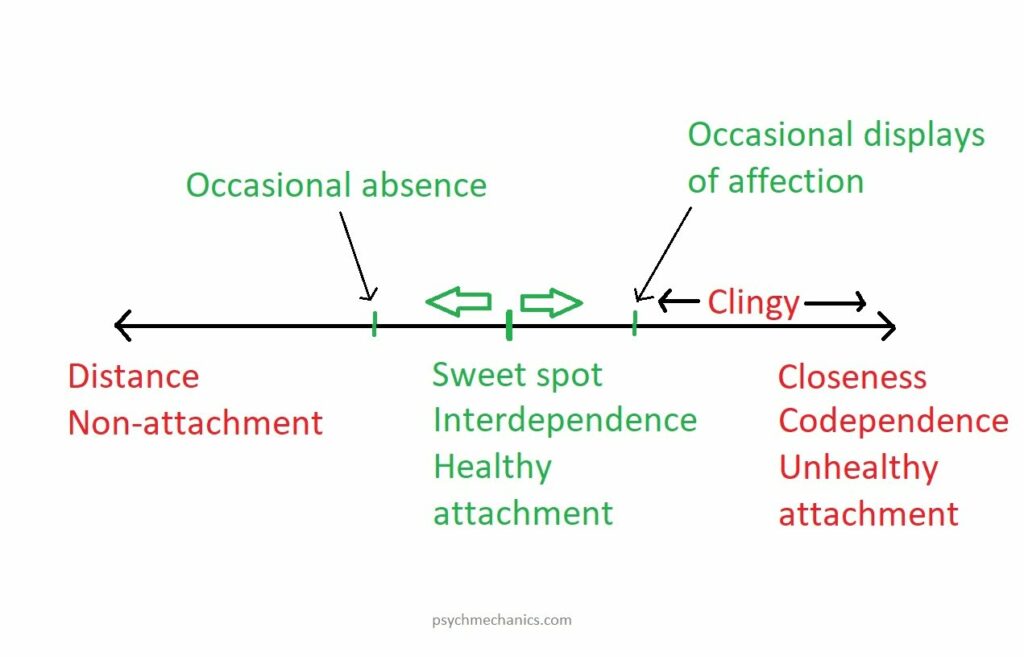When you enter a new relationship, it’s natural to desire to be close to your partner. You’re in the ‘getting to know each other’ phase. The closer you are to each other, the better you get to know each other.
Eventually, when both partners are satisfied with each other, things settle down a bit. You don’t have to talk and meet as often. You feel secure and at home with each other. You’re in a healthy attachment with your partner.

Your relationship suffers if you deviate from the sweet spot of healthy attachment. If you move to the left and increase distance in your relationship, it strains your relationship.
Straining doesn’t mean breaking, though.
It’s okay to have some distance in your relationship from time to time because absence makes the hearts grow fonder. But there’s a limit to that. If you go beyond that limit, you’re like to break your relationship.
Similarly, there’s some wiggle room to the right too. You can move to the right and get closer to your partner from time to time. But there’s a limit. If you go too far, you become clingy and suffocate your partner.
While you can occasionally move slightly to the left and right of the sweet spot, a healthy relationship is one where you spend most of your time in the sweet spot.
Am I clingy?
When you get closer to your partner, it’s natural to worry that you might be becoming clingy. Your partner will likely not call out your clingy behavior. So, the best way to know is to look at your own actions.
If you display most of these behaviors in your relationship, you’re probably being clingy:
1. Spending too much time together
Partners must have their own lives outside of their relationship. If you spend most of your time with your partner, you’re probably clingy. If you make your partner your entire life, it’s a sure sign of clinginess.
2. Relying entirely on your partner for happiness
Ideally, your partner should be one, albeit a significant, source of your happiness. If you cannot be happy without your partner, that can make you cling to your partner.
3. Seeking constant reassurance
Clingy partners want to hear that you love them over and over. Once you get to a point in the relationship where there are healthy levels of mutual trust, a non-clingy partner may find reassuring their clingy partner burdensome.
4. Seeking constant contact
During the initial stages of a relationship, it’s normal to talk all the time. However, if that continues even when the relationship becomes stable, it can be a sign of clinginess.
5. Monitoring your life
Clingy partners have to know where you are and what you do at all times. They may stalk you on social media, steal your passwords, and plant agents to keep tabs on where you are.
6. Controlling your life
Clinginess and control are two sides of the same coin. We cling to control. A clingy partner may control and micro-manage every little detail of your life.
7. Feeling threatened by your ‘life’
A clingy partner wants you to make them your entire life, too, just as they have done to you. If you happen to have a life of your own outside of the relationship, it can threaten a clingy partner.
8. Speeding up the relationship
When you’re with a clingy partner, you may feel like the relationship is moving too quickly. It probably is, and your clingy partner may be responsible for it.
Effects of clinginess
For a relationship to be healthy, there has to be interdependence, not co-dependency or clinginess. We all have a desire for autonomy. We don’t want to be controlled. Clinginess takes away its victim’s freedom and autonomy.
Clinginess is annoying and puts a strain on the relationship. It suffocates and exhausts the other person. Over time, clinginess builds up resentment. And in any relationship, resentment is like slow poison.
Why am I so clingy?
Time for the rubber to hit the road. Now, we’ll get into the different reasons that can contribute to being clingy. As you go through these reasons, the clingy behaviors mentioned earlier will make more and more sense.
1. Insecurity
You either feel secure in your relationship, or you don’t. Insecurity in relationships is the core reason- mother of all reasons- for clinginess.
If you’re sitting on a tree branch and it breaks or is about to break, you’ll hold fast to it.
Similarly, when your relationship is about to break, or you think it’s going to break, you’ll cling to it.
2. Low self-esteem
Having low self-esteem leads to self-doubt and feeling you’re unworthy of your relationship. If you believe you don’t deserve your partner, it’ll be hard to feel secure in your relationship.
You’ll constantly look for ways to sabotage your relationship to prove yourself right, i.e., you don’t deserve the relationship.
You may also think (falsely) that your partner doesn’t like you, even though they’ve repeatedly said they do. So, you may get tempted to end the relationship before they do.
3. Fear and anxiety
If you fear that your partner will leave you for whatever reason, this can lead to insecurity and clinginess on your part. This fear may stem from having abandonment issues rooted in childhood or from a third person you perceive to be a threat to your relationship.
Likewise, anxiety about where the relationship is headed can also lead to clingy behavior. If you’re an anxious person in general, then the anxiety you feel in your relationship is probably the consequence of this generalized anxiety.
Another potential source of anxiety in relationships is the anxious attachment style.1 Attachment styles are formed very early in life. Having an anxious attachment style where you’re constantly afraid that your partner will leave you comes in the way of feeling secure in the relationship.
4. Trust issues
If you don’t fully trust your partner, you’re likely to cling to them. If you fully trust your partner, you have no reason to cling. The branch is intact and strong. You don’t need to grip it.
Trust issues can stem from your past experiences with relationships. If you’ve had negative past experiences in relationships, it’ll be hard for you to trust your partner.
Trust issues can also arise from having a negative model or template for relationships. Our models of the world are primarily formed in childhood. If your parents had an unhealthy relationship, you may come to believe that that’s how intimate relationships are supposed to be.
5. Mate value discrepancy
Not many people talk about this, but it’s definitely something that can contribute to clinginess. I’ve previously explained the concept of mate value. Simply put, it’s a number out of 10 that indicates your level of attractiveness.
If you’re a 5 and have paired up with a 9, you’ve essentially won a lottery. You’re likely to cling to your partner because you don’t want to lose your high mate value partner.
You cling to them so they don’t leave. If they leave, you might have to settle for someone at your level.
6. Idealizing your partner
There’s pairing up with a high mate value person. Then there’s thinking that your partner is high mate value.
When people enter romantic relationships, they tend to idealize their partners. It’s a trick their minds play on them so they can stay in the relationship.
When you idealize your partner, you ascribe more value to them. Since they’re so valuable to you, you feel the need to cling to them just as a child clings to her favorite toy.
7. Different expectations
What feels like clingy behavior to you may seem like harmless affection to your partner. Many people see some degree of clinginess as desirable in their relationships.
This, again, goes back to the relationship template they formed growing up. If their parents were overly affectionate to each other, they’re likely to think that’s how relationships are supposed to be.
Meanwhile, you have your own template of how an intimate relationship should be. In your template, being overly affectionate may not be cute but suffocating.
9. Suspected infidelity
The word clingy sounds so dirty. It has negative connotations. No one wants to be clingy. As with other negative emotions and behaviors, it’s easy to dismiss it as unacceptable without thinking about its evolutionary purpose.
Clinginess can stem from suspected infidelity. If you suspect your partner is cheating or will cheat on you, you’re likely to become clingy. In this case, your clinginess prevents your partner from cheating or probing other potential partners.2
By being clingy, you force your partner to spend all their time with you, so they don’t get a chance to cheat. You monitor their life to scan for potential threats to your relationship.
If you suspect your partner is cheating on you, this hyper-monitoring can help you gather incriminating evidence against them. It can also warn your partner that they’re being watched, which makes them less likely to stray.
Of course, a better way to deal with your suspicions would be to talk it out with your partner because it’s a tricky situation to be in.
- If they’re cheating, your clinginess is doing its job to protect your relationship and your interests. You can catch your partner, call them out and cut your losses.
- If they’re not cheating, your clinginess is a false alarm. There are downsides to these false alarms. They make your suffocated partner think you don’t trust them, straining your relationship.
Your mind cares too much about you and protecting you from cheating. Remember that reproduction is a top priority for the mind. Losing a partner means losing a reproductive opportunity.
Your fast-thinking, in-the-moment, and mostly irrational mind hardly stops to think about the long-term consequences of acting on these false alarms. Consequences such as straining the relationship and, ironically, breaking it and losing a reproductive opportunity.
FAQ
Why am I so clingy to my friends?
You’re probably deriving too much of your self-worth from your friends. It’s the same reason why students cling to their most popular classmates or want to join the u003ca href=u0022/am-i-cool-test/u0022 data-type=u0022URLu0022 data-id=u0022/am-i-cool-test/u0022u003ecoolestu003c/au003e group in class.
Why am I so clingy all of a sudden?
Your sense of security in a relationship keeps fluctuating. But in a healthy relationship, it doesn’t fluctuate much. If there’s a sudden mate value discrepancy (your partner gets promoted) or you find yourself in a weaker position needing your partner more (getting pregnant), you can become clingy.
How do I stop being so clingy?
The most important thing is to have a life of your own outside of your relationship. Having a career, hobbies, and interests allows you to diversify your self-worth sources and not over-identify with your partner. If your clinginess stems from insecurity, it’s best to talk it out with your partner.
References
- Simpson, J. A., & Rholes, W. S. (2017). Adult attachment, stress, and romantic relationships. Current opinion in psychology, 13, 19-24.
- Apostolou, M., & Wang, Y. (2021). What makes it difficult to keep an intimate relationship: Evidence from Greece and China. Evolutionary Psychology, 19(1), 1474704920987807.
